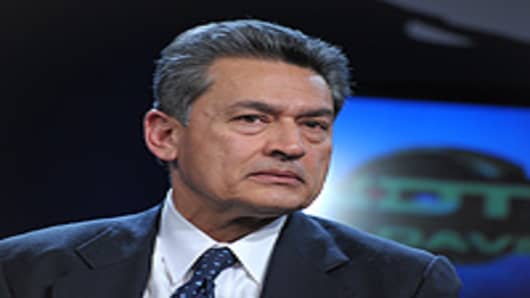On Friday, federal prosecutors told the court overseeing the case against Rajartnam that they intend to introduce audiotapes showing that Rajaratnam got inside tips from Gupta.
This is an important bit of news that was mostly overlooked on Friday. It sounds like the prosecutors may have Gupta’s conversations on tape.
This would bring the case against Gupta to a whole new level. Up until now, most of the case seems to rely on information from a single informant and records that show the timing of phone conversations between Gupta and Rajaratnam. Actual tape recordings of those conversations would be damning if they show Gupta passing on confidential information to Rajaratnam.
One question many are asking is why the SEC made no mention of the tapes that the US Attorney’s office now says prove Gupta is a co-conspirator in Rajaratnam’s alleged insider trading?
The SEC is not automatically entitled to every piece of evidence that the US Attorney’s office might have, even when they are running parallel investigations. Indeed, the law imposes strict restrictions on how criminal prosecutors and civil regulators can share information.
Remember Richard Scrushy? He was the former HealthSouth CEO who was charged with dozens of securities law violations. He managed to get many of the charges against him dismissed by the court on the grounds that the SEC and the US Attorney’s office had improperly colluded in a way that deprived him of his rights. In another case, a finding of improper collusion between the SEC and federal prosecutors resulted in the entire indictment of the defendants being thrown out.
These cases sent law enforcement officials reeling. While it’s still technically possible for them to coordinate investigations, there are many obstacles. The general rule is now that while it is acceptable for information learned from the civil investigation to flow to criminal prosecutors, having information flow from criminal investigators to regulators raises red flags.
As a result, the SEC was probably unaware of the tapes until the prosecutors announced that they existed. A cynic might suspect that the prosecutors brought up the tapes just to let the SEC know they existed. Now the SEC is free to request access to them from the courts. Or, if prosecutors play the tapes in open court, the SEC can use that information in their case against Gupta.
And that, of course, would make the SEC’s case against Gupta much, much stronger.
________________________________________
Questions? Comments? Email us atNetNet@cnbc.com
Follow John on Twitter @ twitter.com/Carney
Follow NetNet on Twitter @ twitter.com/CNBCnetnet
Facebook us @ www.facebook.com/NetNetCNBC



